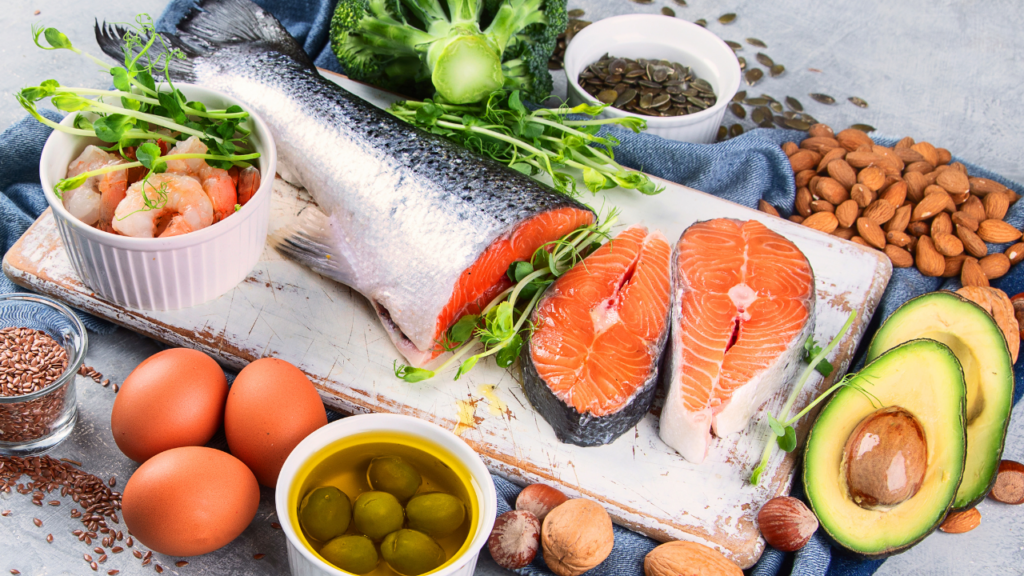|
Getting your Trinity Audio player ready...
|
The key to being happy as you age is keeping your brain healthy.
This extraordinary organ becomes increasingly vital as you age.
Keeping your brain healthy as you reach your golden years allows you to:
- Stay independent
- Keep up with your children and grandchildren
- Pursue hobbies and interests you love
- Travel and explore new places
- Maintain an active and fulfilling social life
- Feel more confident and in control of your life
- Make the most of your retirement years
- Enjoy a higher quality of life overall
In essence, a healthy brain means you can continue living life to the fullest, cherishing every moment, and embracing new experiences with open arms.
To guide you on your journey to maintaining and enhancing your cogntive health, look no further than the advice from Alzheimer’s disease expert, Heather Sandison, ND in our video What is the Best Supplements to Prevent and Reverse Cognitive Decline.
In this blog, we dive into a selection of 9 different supplements recommended by Dr. Sandison that could not only prevent but also reverse cognitive decline.
Table of Contents – Best Supplements for Cognitive Health
Phosphatidylserine and Phosphatidylcholine
Nicotinamide Adenine Dinucleotide (NAD+)
#1 – Nootropic Formulas
Have you ever wished you could be smarter, learn faster, and remember things better? Well, there’s a group of special supplements that might help with just that. They’re called nootropics.
But what exactly are nootropics, and how do they work their magic?
Nootropics are a diverse group of medicinal substances designed to enhance human cognition, particularly when thinking, learning, and memory functions may be compromised.
According to Dr. Sandison, nootropic formulas can work wonders for cognitive function. They come together in diverse ways. Here are some of the ingredients commonly found in these formulas:
- Bacopa monnieri: An Ayurvedic herb that has been shown to improve memory and cognitive function.
- Citicoline: A naturally occurring compound that helps to improve cognitive function and protect the brain from damage.
- Ginkgo biloba: A herb that has been shown to improve blood flow to the brain and protect the brain from damage.
Scientific research underscores how this harmonious balance in nootropics can support focus, recall, and thought processes.
#2- Detox Factors
Scientific studies have underscored the profound link between liver health and cognitive function. To optimize cognitive well-being, Dr. Sandison suggests incorporating detox factor supplements into your regimen.
These supplements play a crucial role in supporting Phase 2 liver processes. When the liver lacks essential nutrients necessary for detoxification, it may hinder Phase 1 detox, leading to the buildup of harmful toxins.
Ensuring the effectiveness of Phase 2 detox processes is essential for eliminating these toxins, which could otherwise harm cognitive function.
In addition to supplementation, clinical recommendations about other ways to promote optimal liver function include:
- Avoid exposure to toxins, such as chemicals and smoking.
- Limit alcohol consumption or consume it in moderation.
- Maintain a balanced diet.
- Engage in regular exercise to support overall health.
#3- Greens Powders

An article from Harvard Medical School emphasizes the cognitive benefits of incorporating green, leafy vegetables into your diet. Top vegetables include:
- Kale
- Spinach
- Collards
- Broccoli
However, we understand that maintaining a diverse green intake can be challenging, especially during travel or busy days. So what can you do to make it easier?
Simply adding a scoop of a leafy greens powder (also sometimes advertised as superfood powders) to your smoothie or water can ensure you receive the necessary greens your brain craves.
#4- Phosphatidylserine and Phosphatidylcholine
These remarkable nutrients can be beneficial for repairing brain cells. They may be particularly useful for patients with traumatic brain injuries or excessive brain inflammation.
Phosphatidylserine and phosphatidylcholine perform a delicate symphony of functions. They step in to regulate cortisol, a hormone that can go haywire under stress, play a pivotal role in the detoxification of harmful substances from the body, and maintain cell membrane integrity.
Several clinical reports have shown that this supplementation supports cognitive function. Their role in cellular signaling and detox is invaluable for cognitive health, states Dr. Sandison.
#5- Zinc
Dr. Heather Sandison states that zinc is one of the best brain supplements due to its multifaceted benefits. According to the Mayo Clinic, zinc is a versatile nutrient that supports various bodily functions, including immune function, hormone production, skin, and cognitive health.
It plays a vital role in neurotransmitter conversion from glutamate to GABA, promoting relaxation, better sleep, and reduced stress. Dr. Heather Sandison affirms that ensuring sufficient zinc intake is crucial for optimal cognitive function and neurotransmitter balance.
#6- Vitamin D3 and K2
Vitamin D3, often paired with K2, is not just a vitamin but a hormone that influences bone and cognitive health. These vitamins are crucial, especially as we age. Why, you may wonder? Here are some benefits of these vitamins:
Vitamin D3:
- Makes your bones and teeth strong
- Gives a boost to your immune system
- Reduces risk of chronic diseases
- Improves mood and cognitive function
Vitamin K2:
- Helps your blood clot when you need it
- Builds strong and healthy bones
- Improves heart health
These two vitamins have been found to optimize the proper delivery of one of the body’s most important minerals: calcium! Accomplishing this will not only support bone health, but these nutrients help protect several important systems in the body, including healthy bones, immunity, and cardiovascular function.
#7 – Omega-3 Fatty Acids

Omega-3s are essential for brain health, mood regulation, and inflammation control. They contribute to cell membrane integrity and have immediate anti-inflammatory effects, as highlighted in an article by the Arthritis Foundation.
While supplements are helpful, the National Health Service of the UK states that incorporating cold-water fish like salmon and sardines into your diet can provide natural omega-3 sources that can boost your cognitive function.
#8- Magnesium 3 & 8
Dr. Sandison recommends brain-specific magnesium supplements, Magnesium 3 and 8, for their unique ability to cross the blood-brain barrier.
The blood-brain barrier acts as a protective shield, selectively permitting essential nutrients and molecules to enter the brain while blocking potentially harmful substances and chemicals from gaining access.
These magnesium supplements are formulated for optimal brain absorption, making them an excellent choice for cognitive support.
Evidence suggests a potential link between higher magnesium intake or circulating levels and a reduced risk of dementia, as detailed in a scientific article. This underscores the significance of these specialized magnesium supplements in promoting brain health.
#9 – Nicotinamide Adenine Dinucleotide (NAD+)
Dr. Sandison underscores the potential of NAD+ (Nicotinamide Adenine Dinucleotide) in reversing aging and boosting cognitive function. An article published in Time even discusses the potential of NAD+ as a longevity elixir.
NAD+ is renowned for its anti-aging properties and its ability to enhance energy, focus, and mental clarity. Research suggests that NAD+ promotes resilience and cognitive improvement, particularly after stress.
While IV administration is most effective, oral supplementation can help maintain NAD+ levels. Dr. Sandison considers this supplement for dementia patients, emphasizing the importance of professional guidance.

Summary
Preserving and rejuvenating your brain health is an ongoing journey, and these meticulously selected supplements offer substantial support in preventing and reversing cognitive decline.
However, it’s important to bear in mind that these supplements are just that – supplements. They should not replace an active lifestyle, exercise, or a healthy diet.
For more information, check out our YouTube Channel filled with free tips and valuable insights about how you can prevent and even reverse Alzheimer’s disease and other forms of dementia.
If you want even more information about how to prevent or reverse cognitive decline from trusted doctors, visit the Reversing Alzheimer’s Summit 3.0.
Disclaimer
The information provided in this blog post is for informational purposes only and should not be considered a substitute for professional medical advice. Always seek the advice of your physician or another qualified healthcare provider with any questions you may have regarding a medical condition. If you think you may have a medical emergency, call your doctor or 911 immediately.
DrTalks Videos About Supplements
Energy Supporting Supplements That Give You Results!
Supplements To Enhance Your Health
The Dirty Truth About Supplements and Cancer
References
Malík, M., & Tlustoš, P. (2022). Nootropics as Cognitive Enhancers: Types, Dosage and Side Effects of Smart Drugs. Nutrients, 14(16), 3367. Read it here.
Roe, A. L., & Venkataraman, A. (2021). The Safety and Efficacy of Botanicals with Nootropic Effects. Current neuropharmacology, 19(9), 1442–1467. Read it here.
Cleveland Clinic. (2023, March 9). What To Know About Vitamin K2 and Its Health Benefits. Read it here.
Braidy, N., Berg, J., Clement, J., Khorshidi, F., Poljak, A., Jayasena, T., Grant, R., & Sachdev, P. (2019). Role of Nicotinamide Adenine Dinucleotide and Related Precursors as Therapeutic Targets for Age-Related Degenerative Diseases: Rationale, Biochemistry, Pharmacokinetics, and Outcomes. Antioxidants & redox signaling, 30(2), 251–294. Read it here.
Sifferlin, A. (2018, February 15). Is an anti-aging pill on the horizon? Time, 186(2), 14-15. Read it here.
Rath, L. (2022, December 8). Omega-3 Fatty Acids for Your Health. Arthritis Foundation. Read it here.
NHS. (2022, November 14). Fish and Shellfish Nutrition. NHS. Read it here.
Tao, M.-H., Liu, J., & Cervantes, D. (2022). Association between magnesium intake and cognition in US older adults: National Health and Nutrition Examination Survey (NHANES) 2011 to 2014. Read it here.
Baeke, F., Etten, E., Overbergh, L., & Mathieu, C. (2007). Vitamin D3 and the immune system: Maintaining the balance in health and disease. Nutrition Research Reviews, 20(1), 106-118. Read it here.
Mayo Clinic. (2023). Zinc. mayoclinic.org. Read it here.
Richter, Y., Herzog, Y., Lifshitz, Y., Hayun, R., & Zchut, S. (2013). The effect of soybean-derived phosphatidylserine on cognitive performance in elderly with subjective memory complaints: a pilot study. Clinical interventions in aging, 8, 557–563. Read it here.
Wu, K., Xu, C., Qiu, G., Guo, Q., Chen, C., Liu, W., Liu, J., Liu, K., & Zhu, F. (2022). Association of lower liver function with cognitive impairment in the Shenzhen aging-related disorder cohort in China. Frontiers in aging neuroscience, 14, 1012219. Read it here.
Harvard Medical School. (2021, March 6). Foods linked to better brainpower. Harvard Health Publishing. Read it here.
van Ballegooijen, A. J., Pilz, S., Tomaschitz, A., Grübler, M. R., & Verheyen, N. (2017). The Synergistic Interplay between Vitamins D and K for Bone and Cardiovascular Health: A Narrative Review. International journal of endocrinology, 2017, 7454376. Read it here.
Ajmera, R. (2023, June 12th). Vitamin D3: Benefits, Sources, Deficiency And Risks. Forbes Magazine. Read it here.
Tao, M-H, Liu, J, Cervantes, D. Association between magnesium intake and cognition in US older adults: National Health and Nutrition Examination Survey (NHANES) 2011 to 2014. Alzheimer’s Dement. 2022; 8:e12250. Read it here.
Cleveland Clinic. (2021, February 22). Liver. Read it here.




I believe the correct type of Magnesium should say Magnesium Threonate, not Magnesium 3 and 8.